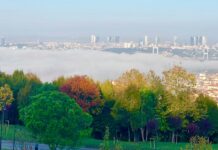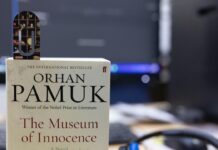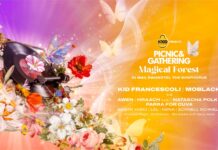SLFF2020 official selection will meet its audience between 1-6 December with the online festival SYFFEVDE at Surdurulebiliryasam.net where all screenings are free of charge. The twenty-six feature length and short documentary films cover a very wide range of subjects and approaches such as sustainable farming, food systems and supply chains, seed, regenerative ranching, right to water, preserving our commons, climate change and migration, gold mining and toxic wastes, megafires, foraging culture, fishing, biodiversity, nature preservation and wildlife, social entrepreneurship and sustainable economy. As the website is in Turkish, those interested should please select the film sessions you would like to join at SYFFEVDE by creating an account at the online festival’s website from here first. You could then choose the film sessions at the event’s page here when you are logged in. Keep in mind that the website allows choosing 6 film sessions per person to be able to reach a wider audience. Films are available in the original language, with English and Turkish subtitles.

If everyone is good, we are fine too…
The SLFF2020 selection shows that a sustainable life is only possible when the living environment and conditions of all living beings on the planet are sustainable; it reminds us that the season, the air, the water, the soil, the wild, the farmer, the seed, the forest, the insect, the tomato and the neighbor must be good for us to be good.
The opening of the festival is on 1 December, with the film “Nations United: Urgent Solutions for Urgent Times”, which was made by the UN to celebrate its 75th anniversary and the fifth anniversary of its Sustainable Development Goals.
During the 6-day online festival, in addition to film screenings, the audience can participate in online side events organized by non-governmental organizations, communities, educational institutions, etc right after each screening. All information about movies, program, registrations and side event organizations can be followed at Surdurulebiliryasam.net and Surdurulebiliryasam.org.
About Sustainable Living Film Festival: Since 2008 SLFF has been providing a better understanding of the concept of sustainability and systemic problems that interact with each other, contributing to the formation of a new culture of living through inspiring stories collected from different parts of the world, and inviting the audience to action for transformation with its impact-oriented selection.
In addition to the festival, SLFF cooperates with Surdurulbiliryasam.net to ensure that the selection of films reaches large segments of the society. Surdurulebiliryasam.net provides content to the events with its SLFF selection so that non-governmental organizations, local governments, educational institutions and companies can benefit after the festival.
For the festival selection, program and all other details:
Senem Açık: senemacik@kronosiletisim.com (0532 739 3009)
Ferda Kervan: info@fpriletisim.com (0533 517 8514)
// Official Film Selection //
Feature Length Films
Food for Change
(Director: Benoît Bringer, 2019, 55′)
Our plate is our most powerful weapon in fighting global warming and in protecting our planet. Today, our diets play a major role in the threats weighing on our planet. But, there is hope. Investigative journalist Benoît Bringer sets off on a global search for women and men who are inventing a new dietary model — one which respects both humankind and nature. This documentary gives us hope, showing us how we can each be a force for change and develop recipes for an economically viable dietary transition.
Foragers
(Director: Roni Aran Adıbelli, Adnan Faruk Turan, 2020, 69’)
Foragers takes part in the Bingöl district of Turkey which is a very rich geography in terms of ecological variety. It is the story of the wild plants and mushrooms growing up in the nature by themselves and the story of the local people creating a relation with the habitat they live in. In this documentary film, the topics like the ancient knowledge of the foraging culture, the special usage of the wild plants and mushrooms changing from one district to another one, alternative medicine, over consumption, nature destruction are examined and reviewed by the scientists, nature researchers and local people.
Growing Solutions
(Director: Leo Horrigan, 2020, 42′)
This film looks at real-life solutions to challenges plaguing farmers, such as water scarcity, soil degradation and the ravages of climate change. The flip side of that coin is a regenerative agriculture that means farmers can rebuild degraded natural resources and be more resilient in the face of mounting challenges. It highlights new milestones on the road to creating a perennial polyculture that could replace our current model that relies on annual crops planted in monoculture. This emerging model mimics Nature’s eminently resilient prairie ecosystems.
Hacking for the Commons
(Director: Philippe Borrel, 2019, 87’)
Nowadays, IT is at the heart of almost all human activity. Has it helped to make us more autonomous citizens? Or has it transformed us into passive consumers of a market which became globalized? We are not even aware that, at the heart of technology, two rationales are now clashing: since the 80’s, the emancipatory principles of free software movements began to attack the exclusive and “private” ones defending intellectual property rights. Free software, free seeds, free medicine, free knowledge… Focusing on freedom, cooperation and sharing, these movements aim to restore the users’ autonomy and power, leading to a world free of patents, for the benefit of the common good.
How We Grow
(Director: Haley Thompson & Tomas Zuccareno, 2017, 65’)
How We Grow is a film about ambitious young farmers building community around locally grown food. The average age of a farmer in the U.S. is 58-years-old. Our farmers are approaching retirement and it is essential that the next generation of farmers have community systems that support them so they may take on farming as a career.
Jozi Gold
(Director: Sylvia Vollenhoven, Fredrik Gertten, 2019, 74′)
Grandmother and environmental activist Mariette Liefferink is up against the richest mining corporations in South Africa. The golden era of mining has left behind 600 kilotons of waste uranium which is not only polluting one of Africa’s biggest aquifers, but raining over the city as fine dust. With 1,6 million people living on radioactive grounds, she is on a mission to force the gold industry to clean up the remains of over a century of gold mining.
Lords of Water
(Director: Jérôme Fritel, 2019, 56’)
They call it ‘blue gold’. Around the world, demand for water is exploding. By 2050, at least one in four will live in a country suffering from water shortages – creating ideal conditions for a new market – Banks, investment funds and hedge funds are all rushing to invest billions of euros in anything related to water. A real monopoly has begun. The financialization of water is a battle taking place on many fronts: ideological, political, environmental, and of course, economic.
Megafires
(Director: Cosima Dannoritzer, 2020, 93’)
For more than a decade, wildfires of unprecedented force have been devouring our lives, homes and forests at a steady pace. Each year, 350 million hectares of forest go up in smoke, the equivalent of six times the size of France. In the US, the fire season now lasts up to two months longer than a generation ago, and the surface burnt annually has multiplied by three. This film sets out on a gripping journey of investigation from Europe to the US, Canada, Brazil and Indonesia to follow the work of a global team of dedicated firefighters, scientists and fire experts as they investigate why our forests are going up in flames, and act on an unexpected discovery: if we want to save our forests, homes, health and our climate, we need to radically change our attitude towards fire and the way we fight wildfires.
Motherload
(Director: Liz Canning , 2019, 86′)
Motherload captures a new mother’s quest to understand the increasing isolation and disconnection of modern life, its planetary impact, and how cargo bikes could be an antidote. Filmmaker Liz Canning cycled everywhere until she had twins in 2008. Motherhood was challenging, but to Liz hauling babies via car felt stifling, missing what made her feel connected, free and alive: her bicycle. She Googled “family bike” and uncovered a global movement of people replacing cars with cargo bikes: long-frame bicycles designed for carrying heavy loads. Her experiences as a cyclist, as a mother, and in discovering the cargo bike world, teach Liz that sustainability is not necessarily about compromise and sacrifice and there are few things more empowering, in an age of consumption, than the ability to create everything from what seems to be nothing.
No Pesticides on My Plate
(Director: Oya Ayman, Sevim Erdem, Eyyüp Epekinci, 2020, 42′)
3 million tonnes of pesticides are used worldwide each year. In Turkey, it is 60 thousand tonnes. Pesticide use causes serious health problems that can result in death, creates soil, water and air pollution and a decrease in biodiversity, and contributes to climate change. No Pesticides on My Plate documentary discusses how pesticides were first used, their harmful effects, experiences of producers that make pesticide-free production possible, and the ways to obtain pesticide-free foods. The documentary is produced in the scope of No Pesticides on My Plate project funded by the European Union under Civil Society Dialogue V Program and implemented by Buğday Association for Supporting Ecological Living. Experts and farmers tell about the destructive effects of pesticides on the one hand, and on the other, about the alternative methods that prove pesticide-free production and food is possible and what can be done for pesticide-free food.
Rewilding
(Director: Vincent Perazio, 2019, 52′)
What if we brought back big carnivores throughout Europe, gave them vast areas to reproduce, and rediscovered the past landscapes? This fascinating vision raises many questions though. Should we not focus on the existing natural heritage? How could we implement it in modern and densely populated countries? What would the risk to human activity be? This film is a unique opportunity to look at both sides of the coin. It also profiles the wildlife resurgence that is happening on European doorsteps, with many species now making a comeback thanks to legal protection and dedicated conservation efforts over the last 30 years. Can we, as Europeans, learn to share our landscapes again with returning species such as bears, bison and beaver?
Seeds of Profit
(Director: Linda Bendali, 2019, 50′)
Sixty years of producing standardized fruit and vegetables and creating industrial hybrids have had a dramatic impact on their nutritional content. In the past 50 years, vegetables have lost 27% of their vitamin C and nearly half of their iron. Through multiple hybridizations, scientists are constantly producing redder, smoother, firmer tomatoes. But in the process, it has lost a quarter of its calcium and more than half of its vitamins. The seeds that produce the fruits and vegetables we consume are now the property of a handful of multinationals, like Bayer, and Dow-Dupont, who own them. These multinationals have their seeds produced predominantly in India, where workers are paid just a handful of rupees while the company has a turnover of more than 2 billion euros. A globalized business where the seed sells for more than gold. According to FAO, worldwide, 75% of the cultivated varieties have disappeared in the past 100 years. With the loss of nutrients and privatization of life, Seeds of Profit reveals the industrialists’ great monopoly over our fruit and vegetables.
Shade Grown Coffee
(Director: Alexander Kinnunen, 2020, 76’)
Shade Grown Coffee is the inspiring story about how growing coffee in the shade of native trees in the tropics can have a truly positive impact on local communities, halt deforestation and protect critical habitat for wildlife – all while giving your daily dose of caffeine a better aftertaste. Get insight into the coffee-making process, all the way from harvesting the ripe cherries to preparing the perfect cup of coffee and hear from passionate coffee farmers, roasters and baristas from around the world how we can all enjoy a more sustainable cup and a brighter tomorrow. A doc for coffee enthusiasts and nature lovers alike, this film aims to deepen the viewers’ understanding of their roles as consumers and appreciation of their next cup of coffee.
The Climate Limbo
(Director: Elena Brunello, Paolo Caselli and Francesco Ferri, 2019, 40’)
The Climate Limbo is a documentary that explores the links between climate change and migrations. Climate change affects everybody: the rich and the poor. It is not an “exotic” issue of Africa or a problem belonging to some far away Pacific island striving with sea-level rise. Climate change affects us all: from the glaciers of the Alps, to the fertile lands of Central Europe, to the hurricane-struck American states, to the Himalayas. This film explores the links between climate change and human migrations through the eyes of scientists, human rights attorneys, and climate refugees.
The New Breed: The Rise of the Social Entrepreneur
(Director: Pete Williams, 2020, 80’)
The New Breed documents the rise of a new generation of change-makers, using business to tackle the worlds biggest social and environmental problems. The film captures the journey of three compelling millennials as they start businesses to tackle social and environmental issues; including poverty, homelessness and environmental pollution. This film is a hybrid documentary with no talking heads, no interviews and no voice-overs. All dialogue comes from authentic meetings each entrepreneur has with their stakeholders around the world. Short sketches throughout the film, led by comedians, musicians and academics, illuminate the global forces that have triggered this movement, tackling topics like colonialism, inequality and ‘the history of poverty’ in simple, fun and easy-to-understand ways.
Short Films
A Fistful of Rubbish
(Director: David Regos, 2019, 14’)
A Western environmental documentary, A Fistful of Rubbish is set in the Tabernas Desert in Spain — Europe’s only desert. An area known for being the backdrop of many famous Western films is sadly being trashed. But now, with the help of some locals, an English expatriate is forming a posse and taking things into his own hands.
A Regenerative Secret
(Director: Ben Cowan and Taliesin Black-Brown, 2018, 8’)
A Regenerative Secret is a powerful mini-documentary that breaks the thinking that cows are the problem. Contrasting the catastrophe of the current cattle industry with the hopeful and inspiring paradigm of Regenerative Ranching. This emerging form of ranching is not only restoring ecosystems but also reversing global warming, restoring watersheds and helping ranchers across the world become more prosperous.
Biomimicry
(Director: Leila Conners, 2015, 22’)
Biomimicry, the practice of looking deeply into nature for solutions to engineering, design and other challenges, has inspired a film about it’s ground-breaking vision for creating a long-term, sustainable world. This film covers how mimicking nature solves some of our most pressing problems, from reducing carbon emissions to saving water; and gives Janine Benyus the space to explain these subtle yet powerful solutions.
Communities of Hope
(Director: Diego and Lou, 2020, 29’)
Communities of Hope is a film born from a quest to discover a regenerative culture. It is an invitation to discover a new way of life. A way of life measured by the rhythms of nature, the depth of human connection, the vast horizon of human potential. Filmed largely at the European Ecovillage Network’s annual European Ecovillage Gathering, and drawing on two years of travel and exploration in communities in Europe, the film takes us on a journey around the mandala of regeneration: how ecovillages relate to the social, economic, ecological and cultural dimensions of sustainability. It offers pathways towards a new way of seeing the world, and a new way of living together.
From Weedy Forests to Grassy Woodlands
(Director: Antoinette Wilson & Jordan Osmond, 2020, 12’)
From Weedy Forests to Grassy Woodlands tells the story of a community-led initiative to mitigate forest fire risk using goats and hand tools rather than herbicides, heavy machinery, and burn-offs. On a land in Australia, prone to massive bush fires, a small group of community-minded folk have pulled together to work towards restoring the ecology of their commons forest – in order to stop the future need for controlled burn-offs by the local fire authority. Burn-offs keep the township safe from out-of-control fires, but they hinder the forest’s ability to regenerate, and thus cannot provide the environment necessary for the diversity of insects, birds and animals that are necessary in a healthy forest on a healthy planet. This work being done is not only showing stunning results on the forest floor, it’s having much broader effects: the forest’s wildlife is thriving, the goats are healthy and happy, but in addition neighbours previously dubious about the project have come on board, so that new and strong community connections are being made.
How We Live: A Journey Towards a Just Transition
(Director: Mark Decena, 2014, 8’)
This film explores the principles of a transition away from the current extractive economy to a socially just, environmentally sustainable economy. What does the next economy look like and how can we rethink our relationship to resources, work and culture? Bay Area activist Gopal Dayaneni looks at how we live now, and how we can do it better.
Mirror
(Director: Pierre Reynard, 2020, 25’)
“At the end of every street, there’s a mountain” the Stendhal’s phrase is well known and every resident of the large region of Grenoble experiences it on a daily basis… City, mountain – this relationship shapes the region far beyond its landscape. Through scientific observation, tourism and sporting activities, through the very living conditions of these spaces, we question the primordial role of a social imaginary, witness of our relationship to the world. The observation of this territory not only then takes on a universal dimension but it also allows each person to look into a Mirror, revealing the reflection of our society.
Nations United: Urgent Solutions for Urgent Times
(Director: Richard Curtis, 2020, 34’)
Nations United: Urgent Solutions for Urgent Times is a very special, first of its kind programme, created by the United Nations on its 75th Anniversary and to mark five years since the adoption of the Sustainable Development Goals. In the midst of a pandemic radically transforming our world, Nations United will tell the story of the world as it is, as it was, and as it could be and set out what must be done for people and planet.
Stolen Fish
(Director: Gosia Juszczak, 2020, 30’)
In the smallest country of continental Africa, Gambia, fish are now being powdered by Chinese corporations and exported to Europe and China to feed animals in industrial farming. As a result, Gambians are being deprived of their primary source of protein while overfishing is depleting marine ecosystems. The film follows three Gambians who share intimate stories of daily struggle, anger, hope and longing for their loved ones in the midst of difficult migration routes. A good example of how the global fishmeal industry impacts the lives of local people of one of the poorest countries in the western coast of Africa.
The Compost Story
(Director: Finian Makepeace, 2017, 7’)
Every year 60 billion pounds of food material go to landfills in the U.S. alone, creating methane gas that is poisoning us and destroying our home. What would happen if this mineral-rich food materials are diverted and turned into compost? Join the movement to regenerate the planet, starting with soil!
The Promise of Biomimicry
(Director: Leila Conners, 2020, 23’)
We are all looking for hope for a sustainable future. We believe biomimicry presents a way to connect with the natural world and learn from its wisdom to better design forms, processes, and systems that are inherently regenerative. In this new film, co-founder Janine Benyus walks us through the emerging discipline, and we meet up-and-coming companies who are working to bring their innovation to market.
Contents courtesy of the organizer.










